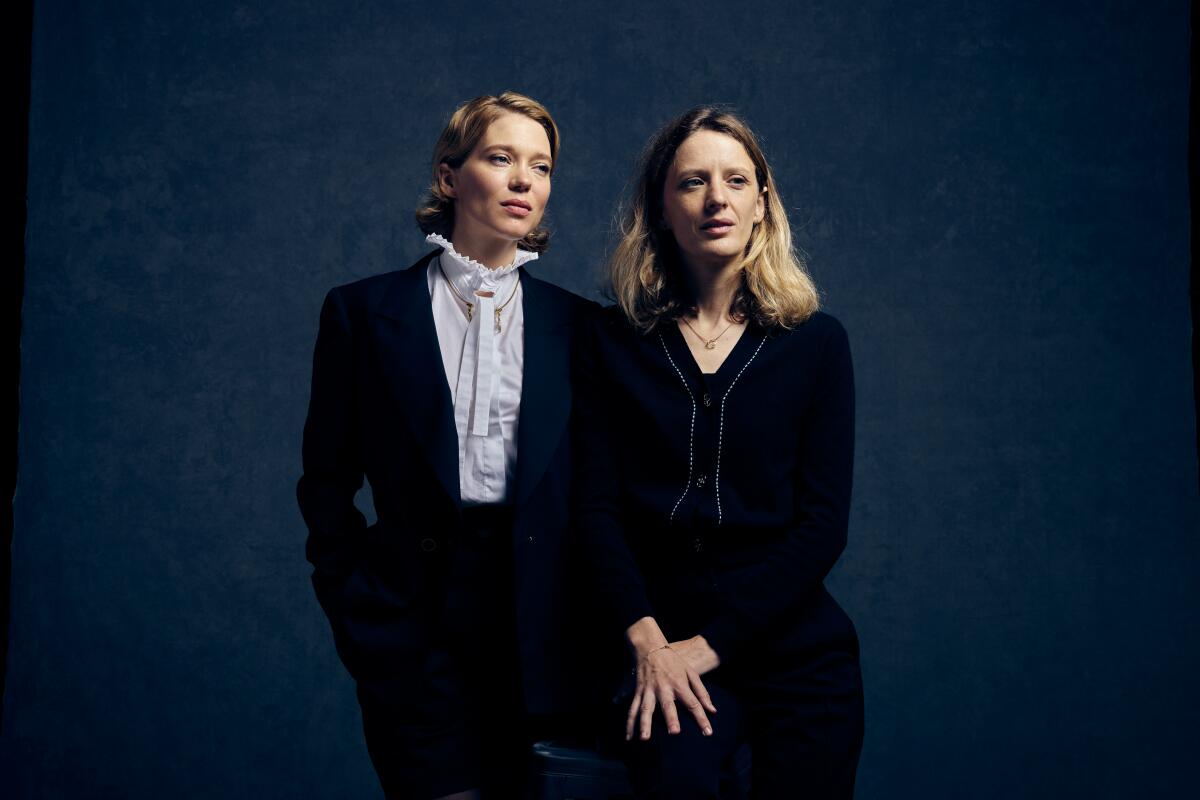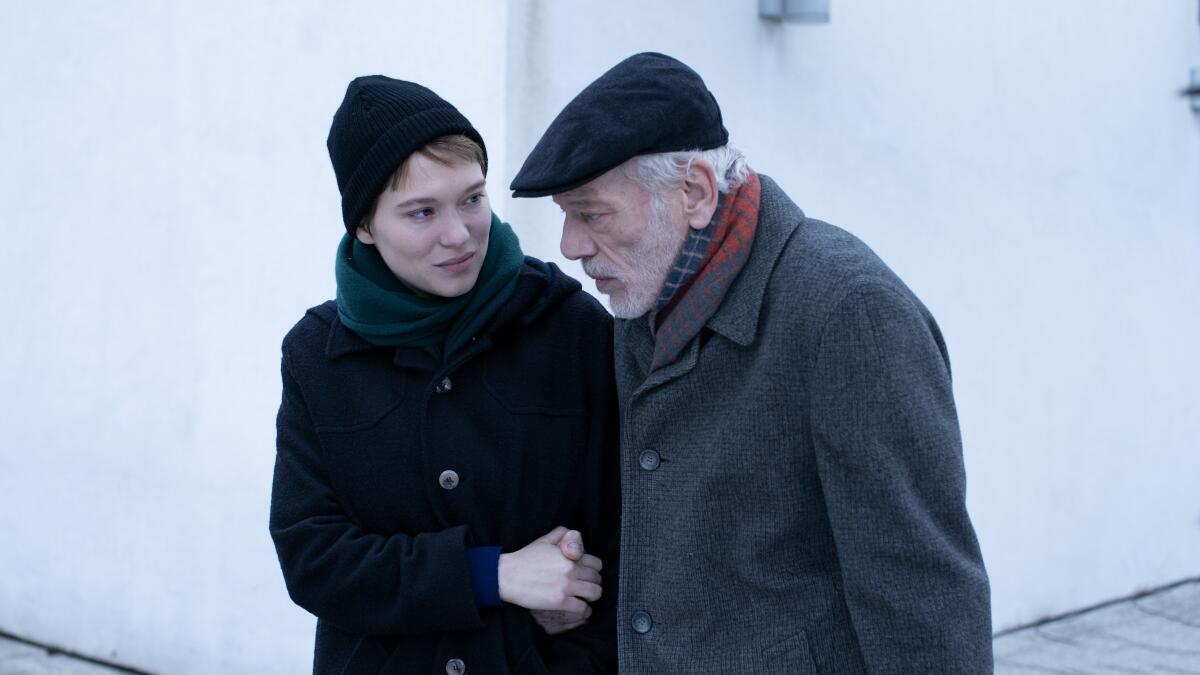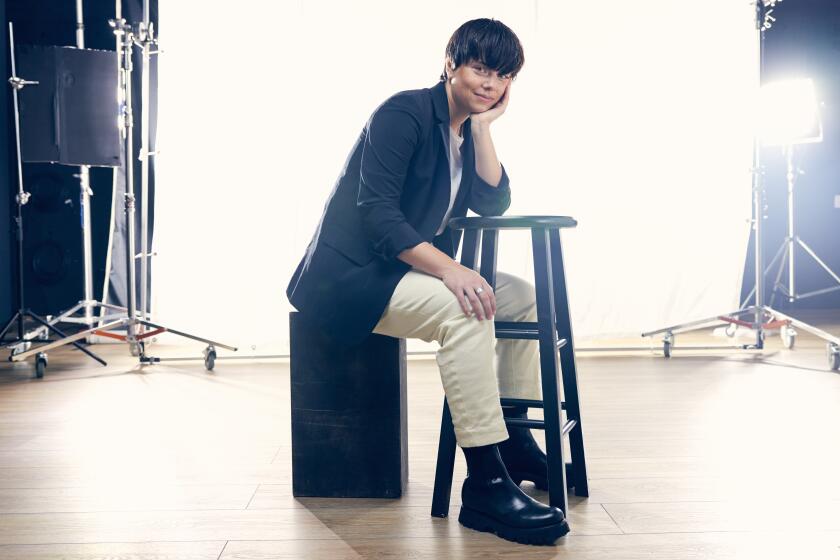How Léa Seydoux helps Mia Hansen-Løve tell a story of loss and rebirth with grace

- Share via
Mia Hansen-Løve’s characters often experience an emotional tumult, even though the movies themselves are often muted, the intimate reckonings draped in the minute drama of ordinary lives. Her understated approach makes acclaimed films such as “Things to Come” and “Bergman Island” feel as natural as breathing, and that same bittersweet beauty shines through in the French writer-director’s latest, the semi-autobiographical “One Fine Morning.”
It’s a deceptively straightforward portrait of Sandra (Léa Seydoux), a widow navigating motherhood, the slow mental deterioration of her dear father, Georg (Pascal Greggory), and an unexpected romance with an old friend, Clément (Melvil Poupaud), who’s married. Resisting treacly melodrama, Hansen-Løve tells this elemental story of loss and rebirth with graceful restraint, respecting her characters (and her audience) too much to resort to manipulative gimmicks.
“I always make my films with my feelings,” Hansen-Løve says emphatically over Zoom from Paris, the sound of children emanating from the other room. “But because I [value] emotions, I don’t want to force it. I want it to come from truth.”
The different stresses bearing down on Sandra — which include a demanding job as a translator — are elegantly interwoven, none of them given more weight than the others. With a reserved manner but a sensitive soulfulness, Sandra balances the euphoria of potential new love with the sad realization that her father’s cognitive decline will only get worse. Hansen-Løve, whose own father suffered from a similar condition, had never met Seydoux but felt she was right for Sandra — precisely because it was the sort of character audiences rarely see from her.
Cate Blanchett (“Tár”), Colin Farrell (“After Yang,” “The Banshees of Inisherin”), Danielle Deadwyler (“Till”) and Mia Goth (“Pearl”) are among our critic’s choices for the best film actors of the year.
“A lot of [her] characters are very sophisticated, very glamorous,” Hansen-Løve says. “In the past, it felt she was seen by male directors [as] a bit of a fantasy. I wanted her to be more down-to-earth, closer to us, closer to me. And I had the feeling there was a rawness about her that my film could maybe emphasize.”
Probably best known as James Bond’s love interest Madeleine Swann in “Spectre” and “No Time to Die,” the five-time César Award nominee confesses she was happy to shed, as she puts it, “the very polished, very made-up” elegance of her more high-profile film roles to depict the subdued, harried Sandra.
“I think it’s the first time that I really played a normal woman, the girl next door,” Seydoux says in a separate phone interview. “I know that people have this image of me — ‘French glamour’ — and it’s really not [me]. I think that, in my life, I’m someone who’s very simple.” But although she felt a responsibility to tell this personal story as truthfully as possible, one thing Seydoux, who is also a mother, couldn’t relate to was Sandra’s close bond with Georg.

“Actually, it’s the exact opposite of my relationship with my father,” she says flatly of her dad, businessman Henri Seydoux. “But sometimes when you make films, it’s like you can heal certain things. I wish I had a very tender relationship with my father, so I was like, ‘Oh, Pascal Greggory can become my father.’ Then, suddenly, I have a father who’s tender.”
The pressures of motherhood are felt acutely throughout “One Fine Morning,” and those strains were just as palpable for Hansen-Løve, a mother of two who wrote the script while pregnant, starting production not long after giving birth. “I can tell you it was probably the toughest period of my life,” she says with a weary smile. Yet she was surprised when journalists pointed out that the movie seemed partly about the perils of parenting. “To me, the banal difficulties of being a mother — I didn’t feel like there was anything special about it. It’s just part of my experience, and I thought it made sense to have it in the film because it’s part of so many people’s life — and so many women.”
Because Hansen-Løve abhors the forced emotional moment, she gravitates toward actors who don’t try to go big. “Usually, the way I direct has a lot to do with less, less, less,” she says. “But with Léa, I didn’t have to say much.” Still, Seydoux, who’s magnificently restrained in the picture, found herself wanting Sandra to react more strongly at times — especially around Clément, who’s torn between her and his wife. “She’s constantly in pain,” Seydoux says of Sandra. “If I was her, I would have been much more [vocal]. But she handles it all, and it makes her very moving. It gives her a certain dignity.”
Since the film’s premiere in Directors’ Fortnight at Cannes, Hansen-Løve has had to discuss her own journey with her father. But whereas Sandra can be guarded, she has no problem discussing his passing, which occurred not because of his condition but because of COVID-19.
“When I finished the script, my father was still alive,” she says. “It was in March 2020, and he died a month later because that was the beginning of COVID. It was the worst time — it was this period when nobody knew how to handle it, which made everything very brutal and inhuman. My father suffered a lot in a way that probably he would not have had to suffer if it was a year later. He would’ve been taken care of with more humanity, I think, if he had not got it in the very beginning.
Women have won the last two Oscars for direction. Can the streak be extended? These 10 women have made films worthy of consideration.
“It’s still very emotional for me,” she continues. “I don’t feel like I am over it — I’m still recovering, if you can ever recover from the death of a beloved father. People sometimes say they are sorry for me, but I actually feel very privileged that I was able to make a film and tell that story, because it has helped me so much to deal with the brutality of that period.”
The sound of a toddler crying comes through the wall again. It’s the child she had as she was preparing to make “One Fine Morning.” “My kid [is] 2½, and he’s baby-sat by another kid, so it’s the two of them right now,” she says, smiling. “There are other kids, too, but the other ones are teenagers. We are what we call in French famille recomposée — it means a family where you have kids from different families.”
Hansen-Løve hasn’t lost that smile throughout the interview. It’s suggested that, although her films aren’t melodramatic or saccharine, there’s a certain amount of optimism embedded within their melancholy framework.
“I’m not sure about that word ‘optimism,’ ” she replies. “It feels almost too dogmatic. I don’t feel I’m trying to influence [the viewer] — I feel I’m being very faithful to my experience of life. I don’t want it to look better or nicer or easier than what it is. So, in this perspective, you could say I’m more of a realistic director than an optimistic one. But in reality, you have everything: There is cruelty, there is tragedy, there is darkness, but there is also light and there is also joy. And there is also the movement of life that gives us new hopes constantly. Life is never stopping, and that’s really the one thing that helps us cope with the difficulties of life.”
More to Read
Sign up for The Envelope
Get exclusive awards season news, in-depth interviews and columnist Glenn Whipp’s must-read analysis straight to your inbox.
You may occasionally receive promotional content from the Los Angeles Times.









